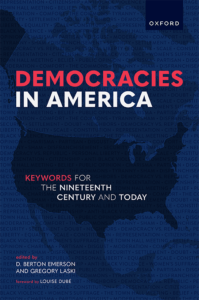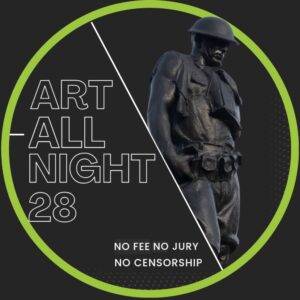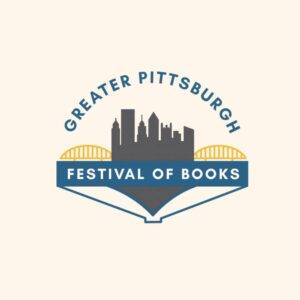From the Publisher: “Democracies in America: Keywords for the Nineteenth Century and Today features short, accessible, and engaging essays on 25 key terms to support democratic dialogue across boundaries and divisions.”
More info About the Author: “Gregory Laski teaches and writes about race, democracy, and citizenship in American literature and culture, past and present. Formerly a faculty member at Carnegie Mellon University, his interests were formed through his work as a teacher for and later director of Breakthrough Pittsburgh, a nonprofit program dedicated to achieving equality in education.”
Author Site
What kind of book is this? Who’s it for?
 Democracies in America: Keywords for the Nineteenth Century and Today is a collection of short, readable essays, which I co-edited with Bert Emerson. Each essay focuses on a key term—what we call a keyword—that speaks to an enduring dilemma of American democracy. Some words are familiar, like representation or liberty. Others are more unconventional, like sham (the term the great African American intellectual and activist Frederick Douglass used to refer to the US republic in the nineteenth century). And some, like partisan, are very much alive in our current political conversations, but have a fascinating—and disturbing—backstory in American history, which our book tells. We hope the book will support study, dialogue, and connection across various boundaries and divisions. It’s meant to reach students in classrooms and citizens in public libraries and cafés; it can also support professional development for K-12 teachers.
Democracies in America: Keywords for the Nineteenth Century and Today is a collection of short, readable essays, which I co-edited with Bert Emerson. Each essay focuses on a key term—what we call a keyword—that speaks to an enduring dilemma of American democracy. Some words are familiar, like representation or liberty. Others are more unconventional, like sham (the term the great African American intellectual and activist Frederick Douglass used to refer to the US republic in the nineteenth century). And some, like partisan, are very much alive in our current political conversations, but have a fascinating—and disturbing—backstory in American history, which our book tells. We hope the book will support study, dialogue, and connection across various boundaries and divisions. It’s meant to reach students in classrooms and citizens in public libraries and cafés; it can also support professional development for K-12 teachers.
Language—and democracy? What’s the connection?
Lots of exciting efforts are underway to reinvigorate civics education in the US. History and political science are well represented in these efforts, for lots of good reasons. But language, verbal skills, speech and debate are all crucial pieces of citizenship. This book centers on how language works in democracy—what the very words we speak mean, and how those often-conflicting meaning factor into the problems and possibilities of American democracy.
What’s the Pittsburgh connection?
There are a few! I grew up in the region and still call Pittsburgh home, even as work and school have taken me away. But I am in Pittsburgh a lot, and even spent a wonderful year as visiting professor at CMU, developing a community-engaged writing course. The book took shape during that year. And the final product features work by two Pitt professors Jean Carr, who has a fascinating take on the meaning of moderation, and Alaina Roberts, who narrates the story of Native American settlement after the Civil War.
How can I learn more?
Well, you can ask your local library to consider adding it to their collections. (Most libraries have a “suggest a purchase” link on their website, or you can just mention the book to a librarian). By virtue of having read this Littsburgh interview, you can also get 30% off the list price by buying the book directly from the publisher and using promo code AAFLYG6 at checkout!

























